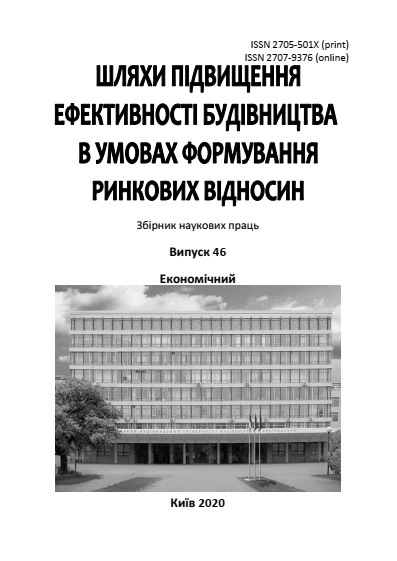Accounting policy of receivables at construction enterprises
DOI:
https://doi.org/10.32347/2707-501x.2020.46.136-143Keywords:
receivables, Accounting Policy Order, doubtful debts reserveAbstract
Analysis of existing approaches to the organization of accounting processes at the enterprise shows that an important element of the accounting policy of the construction company is to create approaches to accounting for receivables in the system of settlements with customers and its reflection in the financial statements. The formed accounting policy on receivables significantly affects the value of financial condition and performance of the enterprise.
The purpose of the study is to analyze existing approaches to determining the accounting policy in terms of receivables, improving the accounting process and improving the efficiency of settlements in construction companies in modern business conditions.
The article considers the existing requirements of the legislation on the accounting policy of settlement operations of the enterprise, the procedure for creating a reserve for doubtful debts, receivables write-off. The provisions of the accounting policy of receivables proved needed to be clarified and detailed in order to improve the efficiency of settlement management and financial condition of the enterprise.
It is proposed to develop a work plan of accounts, job descriptions of the accountant for settlement operations, document flow schedule (in particular in terms of settlement operations), registers of analytical accounting of receivables and other applications that directly regulate the accounting of receivables in the system of settlements with buyers. enterprise. The proposed elements of the accounting policy relate to the debts of customers and are subject to disclosure in the Order on the accounting policy of the enterprise. Adherence to the developed elements of accounting policy will provide reliable information on the company's settlements with debtors, rationally organize the accounting of receivables in the system of settlements with customers, to obtain reliable and complete information about the debt.
References
Береза С.Л. Побудова облікової політики відображення грошових активів та дебіторської заборгованості. Вісник Житомирського державного технологічного університету. 2013. № 1(23). С. 35–44.
Ксьондз С.М. Дебіторська заборгованість як об'єкт управління. Вісник Хмельницького національного університету. Економ. науки. 2010. № 4. С. 105-110.
Науменко І.В. Напрями удосконалення обліку дебіторської заборгованості з покупцями та замовниками. Проблеми генезису економіки інтелектуально-інноваційного капіталу: тези доп. Міжнар. наук.-практ.конф.: Київ. 2020. С.188-190.
Одношевна О.О. Шляхи вдосконалення процесу управління дебіторською заборгованістю. Бухгалтерський облік, аналіз та аудит. 2016. № 10. С. 946–949.
Положення (стандарт) бухгалтерського обліку 10 «Дебіторська заборгованість»: наказ Міністерства фінансів України від 08.10.1999 р. № 237. [Електронний ресурс]. URL: http://zakon4.rada.gov.ua/ laws/show/ z0751-99.
Цегельник Н.І. Формування облікової політики підприємства щодо обліку дебіторської заборгованості в системі розрахунків з покупцями. Облік і фінанси. 2017. № 4. С. 77-81.
Стеценко С.П., Боліла Н.В. Аналітична оцінка і контроль дебіторської заборгованості будівельних підприємств за допомогою контрольних карт. Вісник НУВГП. Серія "Економічні науки". 2020. Том 2. № 90, С. 225-235.
Тараруєв Ю.О. Аналіз дебіторської заборгованості корпоративних підприємств будівельної галузі [Електронний ресурс] / Ю.О. Тараруєв // Економіка та управління підприємствами машинобудівної галузі. 2012. № 3. С. 69–79.
Кириченко Ю.О. Специфіка контролю і управління дебіторської заборгованості малого підприємства будівельної галузі [Електронний ресурс] / Ю.О. Кириченко, Н.В. Горшкова // Економічні науки. Cер.: Облік і фінанси. 2013. Вип. 10(3). С. 289-293.
Оляднічук Н.В. Облік дебіторської заборгованості: проблеми та шляхи їх вирішення [Електронний ресурс] / Н.В. Оляднічук, С.М. Концеба, О.Д. Підлубна // Вісник Київського інституту бізнесу та технологій. - 2019. - № 3. - С. 64-68.
Downloads
Published
How to Cite
Issue
Section
License

This work is licensed under a Creative Commons Attribution 4.0 International License.
Authors who publish with this journal agree to the following terms:
- Authors retain copyright and grant the journal right of first publication with the work simultaneously licensed under a Creative Commons Attribution License that allows others to share the work with an acknowledgement of the work's authorship and initial publication in this journal.
- Authors are able to enter into separate, additional contractual arrangements for the non-exclusive distribution of the journal's published version of the work (e.g., post it to an institutional repository or publish it in a book), with an acknowledgement of its initial publication in this journal.
- Authors are permitted and encouraged to post their work online (e.g., in institutional repositories or on their website) prior to and during the submission process, as it can lead to productive exchanges, as well as earlier and greater citation of published work (See The Effect of Open Access).

